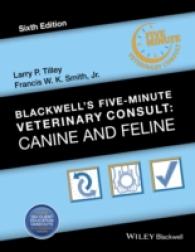Full Description
Publisher's Noteguaranteed by the publisher for quality, authenticity, or access to any online entitlements included with the product.A must read for every pharmacy studentRoadmap to Postgraduate Training in Pharmacy provides the information and expertise pharmacy students need to make confident, informed decisions regarding residency programs, fellowships, and additional degrees.This career-building book includes:Contributions from experienced professionals and new practitioners A timeline for the residency application process includes consideration of programs, preparing for annual meetings, completing applications, the interview process, and forming rank lists Details institutional differences in residency training
Contents
Postgraduate Pharmacy TrainingA Roadmap to Postgraduate Training in PharmacyTable of ContentsChapter 1: History of residency trainingWritten from the perspective of a seasoned professional, this chapter includes:* Description of the beginnings of residency training* Changes in residency training with transition to all-PharmD degrees in pharmacy* Growth in the types of specialties and numbers of programs and positions* Pharmacy organizations' role in the development of residency trainingChapter 2: Introduction - The What and Whys of Post Graduate TrainingThis chapter defines post graduate training, mentions, and differentiates the various options including:* Residencies* Fellowships* Similarities and differences between residency and fellowship training* Additional degree programs complementary to the Doctor of Pharmacy degreeChapter 3: Why should I complete a residency?This chapter discusses the advantages of residency training including:* Benefits of residency/fellowship training* What will a residency provide for me* Pharmacy organization opinions and statements on residency training* Residency training from the employer perspectiveChapter 4: The role of accreditation in postgraduate trainingThis chapter defines accreditation and outlines: * The significance of accreditation in residency training * Organizations granting residency accreditation* Role of fellowship training and its accreditation processes (or lack of)Chapter 5: Things to expect during a residency year This chapter will explain the activities for a residency year including:* Major projects* Medication Use Evaluations* Regional resident conferences* Other common resident activities (inservices, journal clubs)* Pharmacy practice and drug distribution activities* Clinical on call services* General day to day activities of a residentChapter 6: Role of research in residency trainingA major research project is a significant portion of the residency year, this chapter will outline important details related to these activities:* Purpose and objectives of the residency research project* ASHP standards related to research activities* Applicability of research activities to daily practiceChapter 7: Selecting the ideal residency program This chapter provides information on things to consider when choosing to pursue residency training* Decision to pursue residency training* Psychosocial aspects of residency training including work-life balance and stress management* Selecting the residency program that best fits with the candidateChapter 8: The "Ideal" Residency Candidate"Written with input from program directors, this chapter will provide information on the "ideal residency candidate" including:* Making sure career goals align with what the institution provides* CV is organized and complete * Things NOT to do (misspellings etc)* How to conduct oneself on an interview* Professional communicationsChapter 9: Preparing for the ASHP Midyear Clinical Meeting (MCM)This chapter will include a detailed explanation on the following: * Online Residency Directory* Curriculum vitae preparation for Residency Showcase* Correspondence with programs prior to the MCM* What to prepare prior to Residency showcase* What to prepare for participation in Personal Placement Service (PPS) and its role in obtaining postgraduate trainingChapter 10: Activities at the Midyear Clinical MeetingThis chapter will discuss applicant activities at the MCM and emphasize the importance of professionalism. It will include topics on:* Navigating the Residency Showcase* Interactions with programs at the showcase including a list of sample questions * Program receptions and attendance* Structure and function of PPSChapter 11: Post-MCM activities and the residency application process "The Holiday Rush"This chapter will provide the reader with information on the tasks to be completed after MCM including the application process. Professionalism will be re-emphasized and the chapter will discuss:* Thank you letters* Deciding which programs to submit applications* Completing applications* Letters of intent* Updating the Curriculum vitae* How to ask for letters of recommendation* Letters of recommendation/recommendation forms* Meeting deadlines* Applying to the matchChapter 12: Interview ProcessThis chapter includes discussion on considerations, expectations, and unique aspects of the interview process including:* How do interview offers occur* What to expect from an onsite interview* Follow-up after an onsite interview* Sample interview questions* Interview etiquetteChapter 13: Match ProcessThis chapter includes discussion on the match process including:* How does the Match process work* How do you submit your ranking* How does an applicant find out their match results* What happens if I don't match? (The scramble)Chapter 14: Various types of residencies - PGY1 Pharmacy PracticeWritten with input from program directors and preceptors at a variety of institutions this chapter describes the unique aspects of PGY1 programs including:* Overall objective of PGY1 programs in creating a pharmacy generalist* Similarities and differences between Programs at academic medical centers, urban community hospitals, smaller community hospitals, programs at Veterans Affairs hospitals* Required and elective rotation opportunities to consider* Clinical "On-call" activitiesChapter 15: PGY1- Community Pharmacy ResidenciesThis chapter provides information on the unique features and considerations for residencies in community pharmacy practice including:* Accreditation as a joint effort of ASHP and the American Pharmacists Association (APhA)* Corporate and academic support of programs* Learning objectives specific to community pharmacy* Unique activities of community pharmacy training* Personal reflections on community pharmacy trainingChapter 16: PGY1 Community Pharmacy Residency Application ProcessWritten by individuals involved in Community Pharmacy Residency training, this chapter includes:* Information on the APhA residency directory and its resources* Searching for and interacting with residency programs at the APhA Annual meeting* Differences in the application process for Community Pharmacy Residency ProgramsChapter 17: Various types of residencies - PGY1- Managed Care PharmacyThis chapter includes discussion on considerations and unique aspects of managed care pharmacy residencies including:* The roles of ASHP and the Academy of Managed Care Pharmacy (AMCP)* Types of sponsoring organizations* Learning objectives specific to managed care pharmacy programs* Unique activities of managed care training* Personal reflections on managed care trainingChapter 18: PGY1 Managed Care Pharmacy Residency ApplicNER(01): WOW







